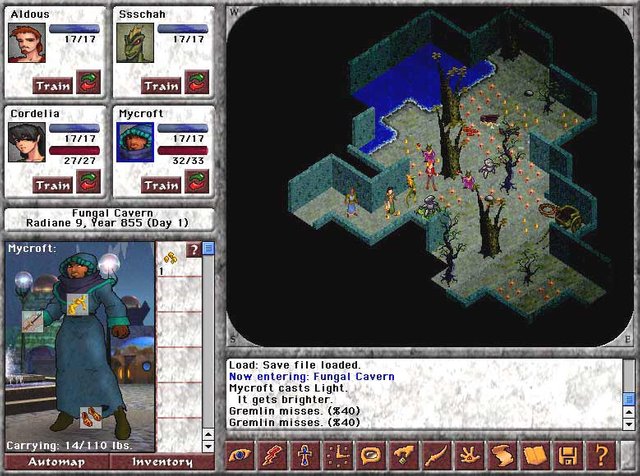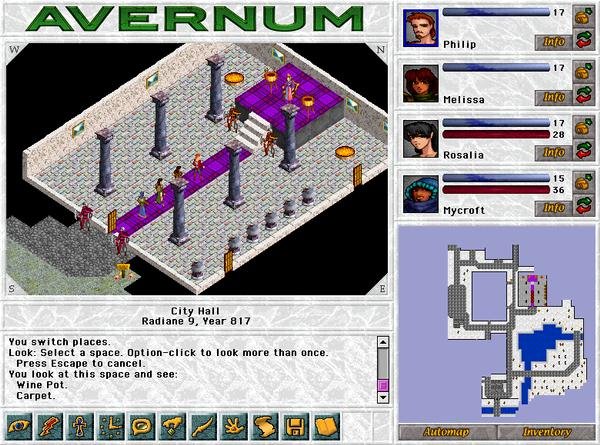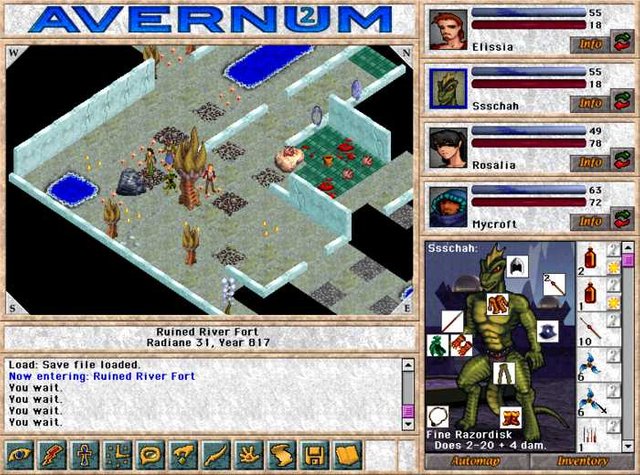Avernum: The First Game I Loved
If you had asked me what my favorite game was for years and years, I would have said Avernum. Heck, I probably still would, as well-worn as its world is in my mind. There are a handful of other games that helped to form how I view making games, but Avernum and its sequels were the games that told me that I would always want to make and explore games not just as a consumer but also as a critic and artist.
Avernum is a lesser-known game, and I’ve been waiting to bring it up during every round of the Archdruid gaming contests. Since it was first released on January 2nd, 2000, it’s been disqualified from every other contest, but it finally gets its chance to shine.
Avernum screenshot courtesy of Spiderweb Software.
Avernum is not a technically impressive game. It’s got a fixed window resolution, 2D graphics that don’t hold a candle to similar late-90s games like Fallout and Baldur’s Gate, and a very simple interface. All of these qualities give it a particular charm, however.
Where Avernum excels (and the reason why I still play the original trilogy over the re-released versions) is in its mixture of complex game mechanics with simple approachability and storytelling. Its characters are defined primarily through spellcasting and combat attributes, with only a handful of non-combat skills, and a lot of the game is spent in combat.
Avernum 2 screenshot courtesy of Spiderweb Software.
However, unlike other games where the tactical element overshadows the roleplaying, Avernum is distinctly a roleplaying game. Thrusting players into a subterranean prison colony, it presents scenarios and challenges that run the gamut from straightforward (go and kill some goblins) to morally complicated and deep.
And this is where the real quality of Avernum and other Spiderweb Software games shines. Despite being based in a simple tile-based world with text-based dialogues, lacking almost all of the fancy tricks of Fallout or similar more full tabletop ruleset conversions, it manages to tell a story in a world that feels vibrant and living, where there is a keen sense of injustice, and the boundaries for exploration extend far into the wondrous and magical.
And, as a kid, the shareware release of Avernum was especially formative because I didn’t have a lot of money to spend on games. I don’t think I got my first video game console until I was in middle school, but my family always had a computer of various quality levels. This steeped me in both the FOSS and shareware communities, which would be responsible for a number of my other most influential games (like Rogue and its successors Tales of Middle-Earth and GearHead, which were my particular favorites in many ways).

Avernum 3 screenshot courtesy of Spiderweb Software.
The wonder of Avernum was that its worlds were so broad and wide, and the writing was so deep, that you hardly noticed that you almost always followed a very linear path with few significant decisions. Jeff Vogel, the creator of Avernum, did such a good job of intuitively crafting the storylines that even in his earlier works where decision-making was more focused on key pivotal points rather than large systemic changes, it still felt like you got to choose to do what you wanted to do. Almost every town and city had side-quests, allowing you to choose who to help (or simply spend countless hours seeking the answer to all of the world’s problems) and, quite honestly, the result was a world that felt both vivid and epic despite its simple graphics and interface.
This isn’t to say that the world didn’t respond to the players. One of the choices that you could make was whether your party was made up of humans, or the feline Nephilim and lizardlike Slithzerikai (yes, I had to look up the spelling). Non-humans frequently provoked hostile responses, especially in the third game, where a return to the surface meant a conflict with the human-dominated Empire.

Blades of Avernum screenshot courtesy of Spiderweb Software.
I think Avernum was a gateway game for me in many ways. I’d played quite complex games and understood and loved them, but it was with Avernum that I got to see just how many moving parts there were. It was a narrative experience in a way that few other games had a chance to be, and combined a love with reading and imagining worlds with the love of games. Though it kept its story separate from all but the most simple of its game mechanics, every decision you made had a consequence and made you feel like a real hero.
Its pace also lent it poignancy. I think Avernum was the first game that I ever felt anyone suffer in. The people of Avernum are oppressed, and some overcome it while others are drowned by the weight of their sorrows and isolation. I don’t remember how old I was exactly when I first played Avernum (it has always been a part of my life as far as my memory goes), but I do know that it was the first time that I looked at a character in a game as a person, even if it was more like a character on the page of a book than a real human being. A trek through Avernum is a trek through the entire human condition, and I think it was the first game to ever tell that story to me.
Spiderweb Software is still around and still making games, the rare example of an indie studio that has stuck around for decades of great games; though I tend to prefer its earlier games due to nostalgia and the fact that they just play faster for someone who’s used to them.
This post was written for the Archdruid Gaming Decades: The 00's contest. Consider checking them out.
It's also worth noting that Spiderweb Software has a new game, Queen's Wish, coming out on Steam next month. I backed it on Kickstarter way back when, and I suggest checking it (and Avernum, Nethergate, Geneforged, and Avadon) out if you love games with a strong emphasis on storytelling.


To listen to the audio version of this article click on the play image.

Brought to you by @tts. If you find it useful please consider upvoting this reply.
Spiderweb for king and queen, they are great! Thank you for the read, didn't know they had a game soon to be released.
This post was shared in the Curation Collective Discord community for curators, and upvoted and resteemed by the @c-squared community account after manual review.
@c-squared runs a community witness. Please consider using one of your witness votes on us here